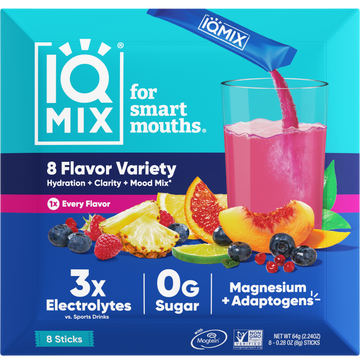Picture your brain as a magnificent tapestry woven over your entire lifetime.
Every newly grown brain cell weaves itself into the intricate threads, adding vibrant colors, textures, and patterns to expand the masterpiece that is your mind.
Neurogenesis is the start of those threads.
Though the bulk of neurogenesis happens during our early development, adult neurogenesis enables us to cultivate more fresh ideas, enhance our learning abilities, and stave off cognitive decline across our lifespan.
So we’re exploring everything you need to know about what helps (and hinders) the growth of new brain cells today.
Let’s run through the basics first by covering:
What is Neurogenesis?
Neurogenesis is the process of forming new neurons in the brain. Neurons are specialized cells that transmit and process information throughout the nervous system. They create the building blocks of our thoughts, sensations, and actions.
Neurogenesis is the hallmark of a developing brain.[*] The average brain contains ~100 billion brain cells, most of which are formed during embryonic development.[*]
Many neuroscientists thought the central nervous system (which includes the brain) was incapable of adult neurogenesis until 1998, when pioneering research from Peter S. Eriksson and his team revealed new neuron development in the hippocampus.[*]
How Does Adult Neurogenesis Work?
Adult neurogenesis occurs in three brain regions:[*]
- The amygdala
- The subventricular zone (SVZ) of the lateral ventricles
- The subgranular zone (SGZ) of the dentate gyrus (DG) of the hippocampus
Neurogenesis in the SVZ starts with dormant cells in the olfactory bulb (where your cells that detect smell live). These interneurons migrate to the granule cell layer and evolve into neuroblasts, or cells that will eventually become neurons.[*]
However, the majority of neurogenesis takes place in the DG of the hippocampus.[*][*] They say we generate new neurons throughout life here — to the tune of 700 to 1,500 each day![*][*]
This is also where researchers identified thousands of immature neurons in varying degrees of maturation and differentiation stages in healthy 90-year-old humans.[*]
Here’s a simplified breakdown of how this process works:[*][*][*]
The discovery of neural stem cells in the brains of adult mice provided the first anatomical evidence of adult neurogenesis.[*] When they found newly developed neurons in the hippocampus of adult rats, scientists began studying the adult mammalian brain (via primate research) and eventually adult human brains.
We still don’t know everything about adult neurogenesis. But emerging neuro-imaging and labeling models may be key to future psychiatry and neuroscience research. These can better detect the growth and integration of newly formed cells in and around neurogenic niches and existing neural circuitry.[*]
So Why is Adult Neurogenesis Important?
Adult hippocampal neurogenesis matters because growing new brain cells empowers us to:
Boost Plasticity, Learning, & Stress Resilience
Neuroplasticity refers to our brain’s ability to adapt, reorganize, and form new connections between neurons.[*]
According to research from Kempermann and Gage, neurogenesis in the adult hippocampus might provide a neurogenic reserve that helps our brain remain flexible and facilitates learning.[*]
This synaptic plasticity allows our brain to quickly respond to new life experiences, adapt to changing environments, become resilient to stress and anxiety, and sharpens our minds.[*][*][*]
Prevent or Treat Cognitive Decline
The hippocampus is one of the most affected areas in neurodegenerative conditions like Alzheimer’s disease and dementia.[*] Though this is the prime area for neurogenesis in the adult brain, the number and maturation of these neurons progressively declines as these conditions advance.[*][*]
The inability to replace dying cells is a potential cause and biomarker of neurological diseases and cognitive impairment.[*]
Since there’s no cure for these conditions, researchers are considering treatment options to enhance neurogenesis in these patients. For example, they could activate dormant stem cells to develop more neurons or glia cells, or transplant stem cells directly to damaged areas.[*][*]
Scientists believe dementia prevention via neurogenesis in early adulthood may still be the best course until these options prove viable.
How To Grow New Brain Cells
Combining what we know from animal and human studies, it’s evident that lifestyle factors such as chronically high blood sugar levels, a lack of exercise, stress, anxiety, and sleep deprivation all tank neurogenesis.[*]
Here’s what researchers recommend to grow new brain cells:
1. Get Your Stress Under Control
Both acute and chronic stress decrease hippocampal neurogenesis.[*]
High cortisol levels (i.e., the “stress hormone”) stop cell proliferation in the adult medial prefrontal cortex and significantly disturbs the creation of nerve cells in the hippocampus.[*][*]
Take this nudge to find a science-backed stress-management technique that works for you. Consider:
- Following an Anti-Stress Diet
- Yoga or deep breathing exercises[*][*]
- Meditation and mindfulness[*][*]
- Gratitude journaling[*]
- Engaging in hobbies[*]
- Spending time in nature[*]
Regular meditation can reduce stress, boost attention and concentration, and improve overall brain health.[*] Scientists learned it can also stimulate neurogenesis and enhance brain plasticity.[*][*]
All those perks are worth learning how to find your zen.
2. Exercise Regularly
Exercise increases blood flow to your brain, delivering more oxygen and vital nutrients to stimulate neurogenesis.[*][*][*] It’s also a natural stress reliever and antidepressant, a further enhancer of neurogenesis.[*][*]
So what’s the best exercise for brain health?
High-intensity and aerobic exercise offer the biggest wins. Studies show these have:
- Resulted in a significant increase in working and spatial memory[*][*]
- Doubled the number of adult-born neurons in mice[*]
- Reversed age-related hippocampal volume loss in elderly adults with dementia by 1 to 2 years[*]
Don’t feel like breaking a sweat? Low-intensity exercises like walking have been shown to increase human hippocampal volume, which may promote cognitive health, improve memory, and reduce dementia risk.[*]
3. Take Your Brain Vitamins (i.e., Nootropics & Adaptogens)
Nootropics are natural cognitive enhancers that improve memory, focus, learning, and mental performance.[*][*] Like exercise, they also increase oxygen-rich blood flow to your brain to spur neurogenesis.[*]
There are over 100 different nootropics. But these specifically help grow new neurons and protect their survival:
Adaptogens are active compounds in plants and mushrooms that help us naturally cope with stress. They create a friendly environment for new neurons to develop. Lion’s mane is one of the best adaptogens to reduce depression, stress, and anxiety.[*][*][*]
🥳 Every IQBAR, IQJOE, and IQMIX packet contains concentrated lion’s mane extract to ignite a neurogenesis party anytime, anywhere.
4. Learn New Skills & Take On More Challenges
New life experiences. That’s one theory for why postnatal neurogenesis occurs more abundantly than it does in the adult human hippocampus.[*]
Babies and young adults learn so many new skills and constantly engage in mentally stimulating activities. This learning increases synapses (i.e., communication between neurons) and enhances cognitive function.[*]
So the more we learn from new stimuli, the more we promote neurogenesis, strengthen neural connections, and increase the survival rate of newly-formed hippocampal neurons.[*][*][*][*]
Give your brain a mental workout by stepping out of your comfort zone. Embrace the excitement of the unknown. Explore new environments, challenge yourself to learn new skills, flex your neural muscles with a puzzle, second language, musical instrument, etc.
5. Prioritize Your Sleep
Skipping sleep and caffeinating your way through the day? Sleep deprivation increases cortisol, which we know blocks neurogenesis.[*][*] It’s also been shown to:
- Result in learning and memory impairments
- Harm hippocampal neuronal plasticity
- Reduce hippocampal cell proliferation and neurogenesis
- Eventually lead to a reduction in hippocampal volume, a biomarker of neurodegeneration
Quality sleep is essential for brain health and neurogenesis.[*] Your body uses its deep slumber to remove toxins, repair, and regenerate.[*] These actions all pave the way for the growth of precursor cells for new neurons.
Aim for 7 to 9 hours of uninterrupted sleep to give your noggin the rejuvenating rest it craves.
New Neurons, Better You
Neurogenesis is a powerful process that helps you maintain brain vitality, enhance mental acuity, and prevent neurodegeneration as you age. The science-backed tips we shared today should encourage new brain cells so you can continue weaving the stunningly complex tapestry that is your mind.
🧠 It’s never too late to unlock your brain’s untapped potential! Nurture your cognitive health with IQBAR’s line of goodies developed with five key brain nutrients to drive performance.



